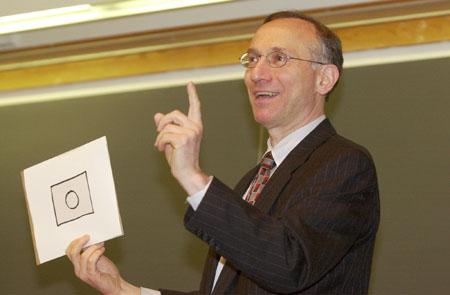Fineberg sees tradition amid change

With a nod to failed predictions of the past, Provost Harvey V. Fineberg Tuesday painted a picture of Harvard in the 21st century as a place in even greater demand, with more adult students, and with learning occurring in different times and places.
Fineberg said new technology that makes greater use of the Internet and computers will surely be a component of Harvard’s future. But instructors, technicians, and administrators have to keep in mind that technology should serve education, not the other way around.
Even with technology-driven changes to classroom learning, he said, some types of learning will remain unaffected. Harvard students learn much outside the classroom, Fineberg pointed out, in interactions with classmates, on clubs and sports teams, and through interactions with the community in volunteer activities.
“There are going to be displacements of both the time of learning and the place of learning,” Fineberg said. “We’re going to do radically exciting things, but through it all, we’ll succeed only if we keep our focus on why we’re doing it.”
Fineberg addressed about 300 Harvard administrators who gathered in Emerson Hall for the second event in the 2000-01 Harvard Administrators’ Discussion Series. The series is sponsored by the Harvard Administrator’s Forum, a voluntary organization of administrators who share information across school and department boundaries.
Richard Stomberg, who chairs the Forum’s steering committee, said the record turnout forced the speech to be moved from the Barker Center, where it had originally been scheduled.
“I thought it was a great opportunity to share ideas,” Stomberg said. “I think [Fineberg] has a wonderfully cogent way of pulling together ideas.”
Fineberg began his speech by talking about the dangers of prediction, describing the 1890s patent commissioner who concluded, “Everything that can be invented has been invented,” and the Popular Mechanics prediction in the 1940s that future computers would weigh as little as a ton and half.
The only safe predictions, Fineberg said, are those that are already true, but unnoticed by most people. Sticking to that guideline, Fineberg drew on observations of Harvard today to draw a picture of Harvard in the future.
Technology will undoubtedly be important, because it already is. More and more instructors are designing class Web pages rich in content, including everything from musical scores to video lectures to virtual field trips.
Technology will enable learning to be more “distributed,” Fineberg said. Though there is a movement toward “distance learning,” where students learn via the Internet rather than in a class, several Harvard programs are experimenting with programs that have a little bit of both. These hybrid programs allow face-to-face contact with professor and classmates for seminars and other periodic gatherings, while learning continues between the gatherings at a distance, via the Internet.
Whatever is done, it may be difficult to keep up with student expectations. Today’s freshmen were born in the early 1980s and have grown up around personal computers. While some adults still look at computers as mysterious objects, students today look at them as ordinary objects, the same way older adults look at the telephone.
For the first time this year, a regular survey of undergraduates showed that more than half felt their class learning was “significantly less valuable” in courses that didn’t have a good Web site, Fineberg said.
Perhaps driven by the increasing use of technology in our society, the demand for education is rising. Fineberg said he expects that trend to continue, citing one estimate that by 2004, 100 million adults will participate in adult education.
That trend is already affecting Harvard, with the fastest growth coming in programs that serve adults in the workforce, such as executive education, continuing education, and Extension School programs.
“We know education is going to be a growth industry. We are in an increasingly knowledge-based economy,” Fineberg said.
University-wide, Fineberg expects the different schools to chart their own courses with respect to technology. From the center, he expects a move to adopt design standards that will allow innovations developed at one school or department to be used at another.
Despite all the talk of innovation, however, Fineberg said he didn’t see important educational traditions at Harvard being replaced wholesale.
“We can preserve what’s valuable about traditions and not sacrifice them as we search for what’s worthy about innovation,” Fineberg said.




